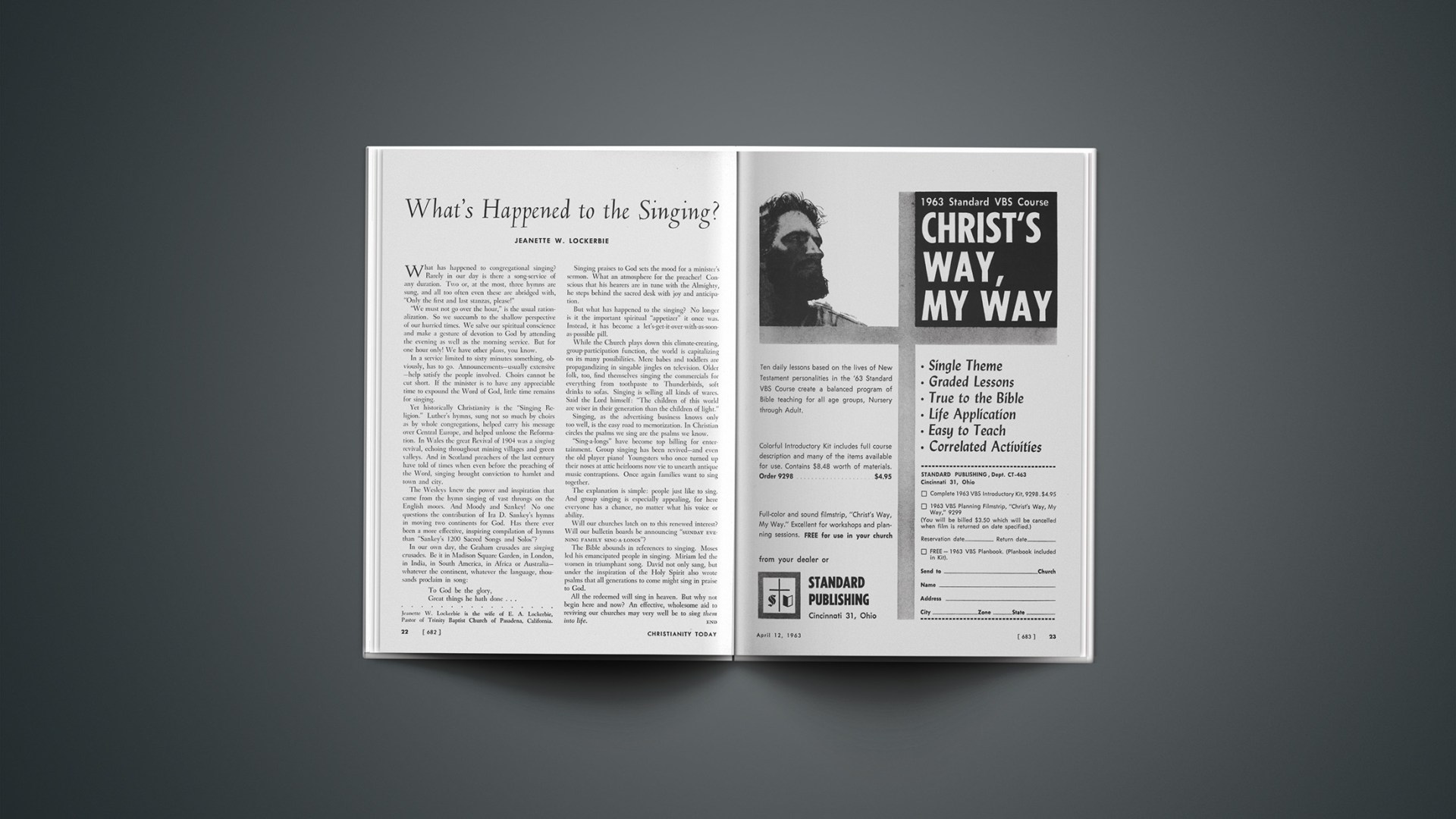What has happened to congregational singing? Rarely in our day is there a song-service of any duration. Two or, at the most, three hymns are sung, and all too often even these are abridged with, “Only the first and last stanzas, please!”
“We must not go over the hour,” is the usual rationalization. So we succumb to the shallow perspective of our hurried times. We salve our spiritual conscience and make a gesture of devotion to God by attending the evening as well as the morning service. But for one hour only! We have other plans, you know.
In a service limited to sixty minutes something, obviously, has to go. Announcements—usually extensive—help satisfy the people involved. Choirs cannot be cut short. If the minister is to have any appreciable time to expound the Word of God, little time remains for singing.
Yet historically Christianity is the “Singing Religion.” Luther’s hymns, sung not so much by choirs as by whole congregations, helped carry his message over Central Europe, and helped unloose the Reformation. In Wales the great Revival of 1904 was a singing revival, echoing throughout mining villages and green valleys. And in Scotland preachers of the last century have told of times when even before the preaching of the Word, singing brought conviction to hamlet and town and city.
The Wesleys knew the power and inspiration that came from the hymn singing of vast throngs on the English moors. And Moody and Sankey! No one questions the contribution of Ira D. Sankey’s hymns in moving two continents for God. Has there ever been a more effective, inspiring compilation of hymns than “Sankey’s 1200 Sacred Songs and Solos”?
In our own day, the Graham crusades are singing crusades. Be it in Madison Square Garden, in London, in India, in South America, in Africa or Australia—whatever the continent, whatever the language, thousands proclaim in song:
To God be the glory,
Great things he hath done …
Singing praises to God sets the mood for a minister’s sermon. What an atmosphere for the preacher! Conscious that his hearers are in tune with the Almighty, he steps behind the sacred desk with joy and anticipation.
But what has happened to the singing? No longer is it the important spiritual “appetizer” it once was. Instead, it has become a let’s-get-it-over-with-as-soon-as-possible pill.
While the Church plays down this climate-creating, group-participation function, the world is capitalizing on its many possibilities. Mere babes and toddlers are propagandizing in singable jingles on television. Older folk, too, find themselves singing the commercials for everything from toothpaste to Thunderbirds, soft drinks to sofas. Singing is selling all kinds of wares. Said the Lord himself: “The children of this world are wiser in their generation than the children of light.”
Singing, as the advertising business knows only too well, is the easy road to memorization. In Christian circles the psalms we sing are the psalms we know.
“Sing-a-longs” have become top billing for entertainment. Group singing has been revived—and even the old player piano! Youngsters who once turned up their noses at attic heirlooms now vie to unearth antique music contraptions. Once again families want to sing together.
The explanation is simple: people just like to sing. And group singing is especially appealing, for here everyone has a chance, no matter what his voice or ability.
Will our churches latch on to this renewed interest? Will our bulletin boards be announcing “SUNDAY EVENING FAMILY SING-A-LONGS”?
The Bible abounds in references to singing. Moses led his emancipated people in singing. Miriam led the women in triumphant song. David not only sang, but under the inspiration of the Holy Spirit also wrote psalms that all generations to come might sing in praise to God.
All the redeemed will sing in heaven. But why not begin here and now? An effective, wholesome aid to reviving our churches may very well be to sing them into life.
END










